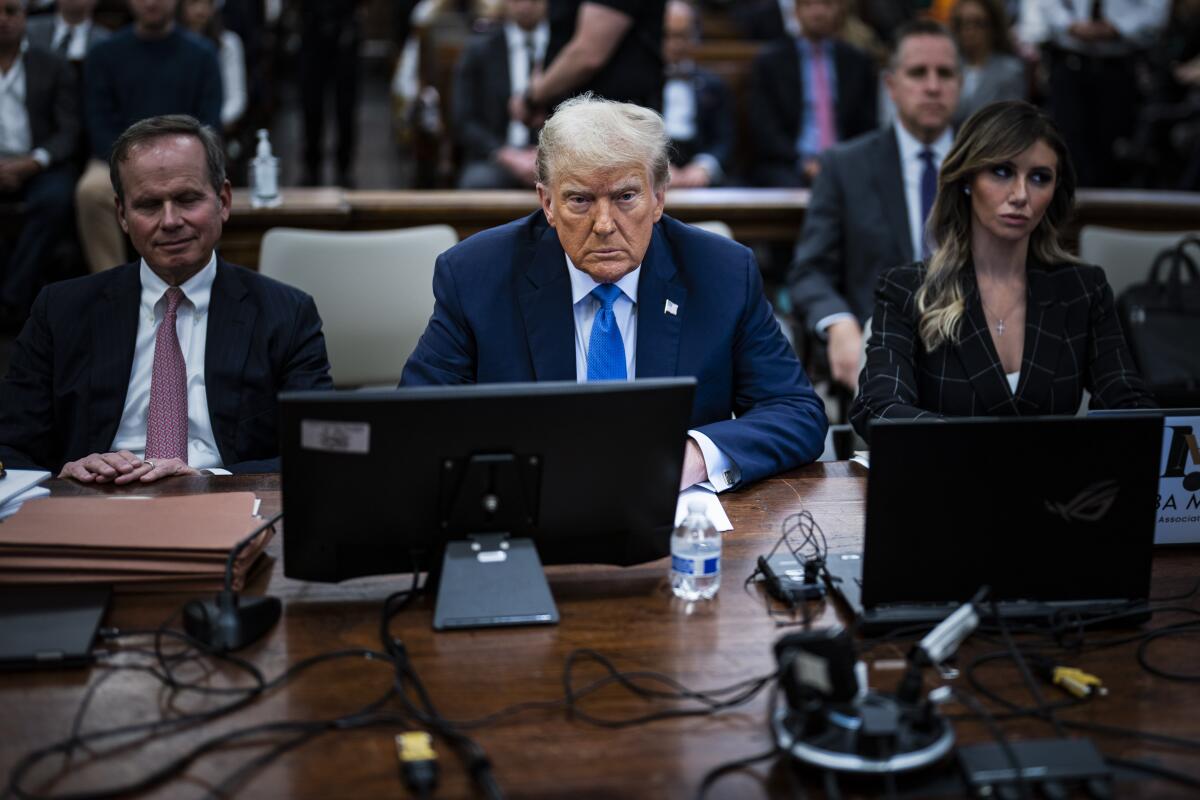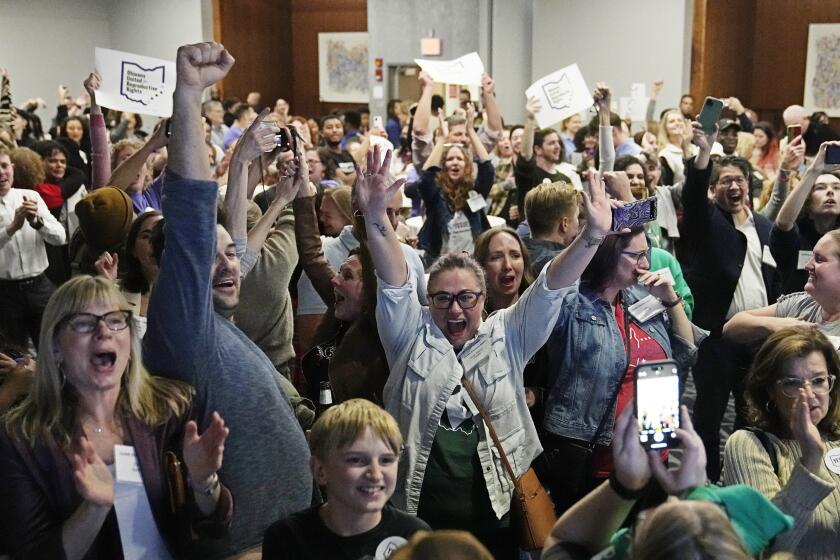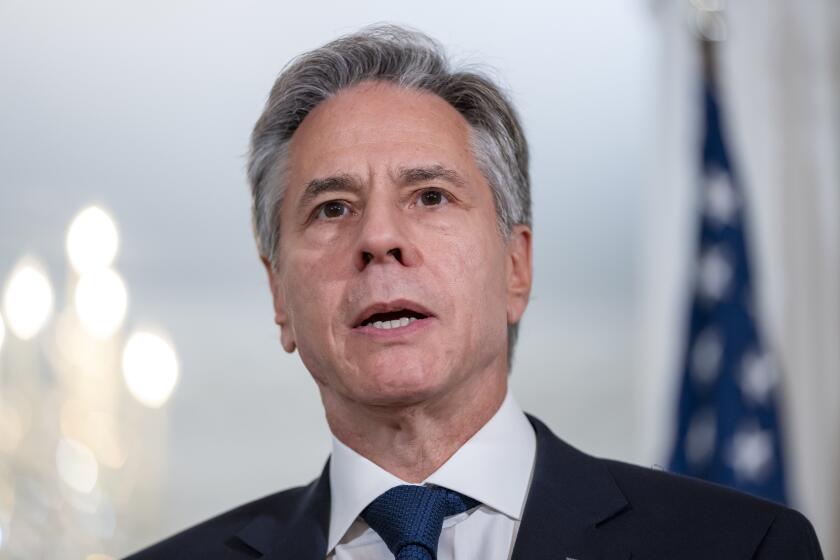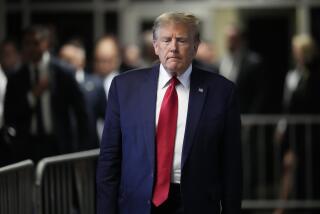Column: Trump’s legal strategy makes a lot of noise, but it hasn’t solved his problems in court

- Share via
WASHINGTON — As he battles criminal prosecutors and civil suits in four jurisdictions, former President Trump is relying on three tactics: denounce, disrupt and delay.
In the short run, that may be good politics; Trump’s self-portrayal as a martyr appears to have cemented his hold on the Republican presidential nomination.
But as a legal strategy, it’s been a bust.
Trump has denounced prosecutors as thugs, judges as unfair and his indictments as illegitimate, which hasn’t solved any of his problems in court.
In New York last week, the former president was intent on disrupting the state’s civil suit against him on allegations of financial fraud.
“This is a very unfair trial,” he lectured Judge Arthur Engoron. “We have a very hostile judge.”
Engoron largely ignored the jabs.
“You can attack me in whichever way you want, but please answer the questions,” he said.
“The judges are bending over backwards to avoid litigation over whether Trump’s rights are being infringed,” said Donald B. Ayer, who was a top Justice Department official in the George H.W. Bush administration. “They’re being smart. ... and the process is moving forward.”
Republicans tried three strategies to defeat abortion rights in this week’s elections. All three failed. But the GOP’s strong antiabortion wing won’t let the party change course.
In two federal criminal cases, the former president’s main goal has been to delay.
Polls have found that Trump’s chances of winning next year’s presidential race could hinge on whether he is convicted of a crime before election day. A New York Times-Siena College survey reported that a conviction might prompt 6% of voters to change sides — a shift big enough to flip the outcome.
If Trump regains the presidency, he could escape accountability by ordering the Justice Department to halt its prosecutions. So, timing matters — a lot.
But his lawyers haven’t succeeded in postponing either federal case.
In Washington, D.C., Judge Tanya Chutkan has scheduled March 4 to begin Trump’s trial on federal election interference charges.
In that case, Trump’s best shot at delay lies with the Supreme Court, which could put the trial on hold while considering whether a former president can be prosecuted for decisions he made in the White House.
President Biden and his aides say they hope to revive the moribund goal of a two-state solution between Israel and the Palestinians. It will be a daunting task.
Trump’s lawyers have filed a motion arguing that his effort to overturn Joe Biden’s election was a legitimate exercise of his authority as president and that he should be “absolutely immune from prosecution.”
Unsurprisingly, prosecutors have disagreed, arguing that Trump’s attempts to persuade states to change their election results were acts he undertook as a political candidate, not as chief executive of the federal government.
No court has decided whether former presidents are immune from prosecution, because no other former president has been indicted.
If the issue reaches the Supreme Court, that would almost surely delay a trial for months.
“I’d guess they could decide it by July 1,” said Paul Rosenzweig, a former federal prosecutor. “But even if they expedite, the Supreme Court is not expeditious.”
That timetable would still give Chutkan time to hold a trial before election day — assuming the Supreme Court rules against Trump.
In a second case, Trump’s indictment on accusations of improperly retaining classified documents at his Mar-a-Lago estate, Judge Aileen Cannon has been more sympathetic to his lawyers’ pleas for extra time to prepare.
Last week, she refused their request to postpone the trial from her target date of May 20, but she promised to revisit the question in March. The burden of handling thousands of highly classified documents has already slowed pretrial proceedings, and lawyers say that court date is almost certain to slip.
A third criminal case, the Georgia prosecution on charges that Trump and others conspired to upend the election result there, doesn’t have a start date yet.
In a setback for Trump, four defendants — three of them former lawyers for his 2020 campaign — have negotiated plea deals and agreed to testify for the prosecution.
Since that isn’t a federal case, Trump would not be able to halt the prosecution if he regains the White House, but he could try to persuade Georgia’s Republican-led state Legislature to intervene.
But even if he loses every legal battle, Trump’s scorched-earth tactics could still have a corrosive effect.
“He’s slowly eroding faith in the rule of law, at a terrible cost that will reap the whirlwind,” Rosenzweig said.
More to Read
Get the L.A. Times Politics newsletter
Deeply reported insights into legislation, politics and policy from Sacramento, Washington and beyond. In your inbox three times per week.
You may occasionally receive promotional content from the Los Angeles Times.













